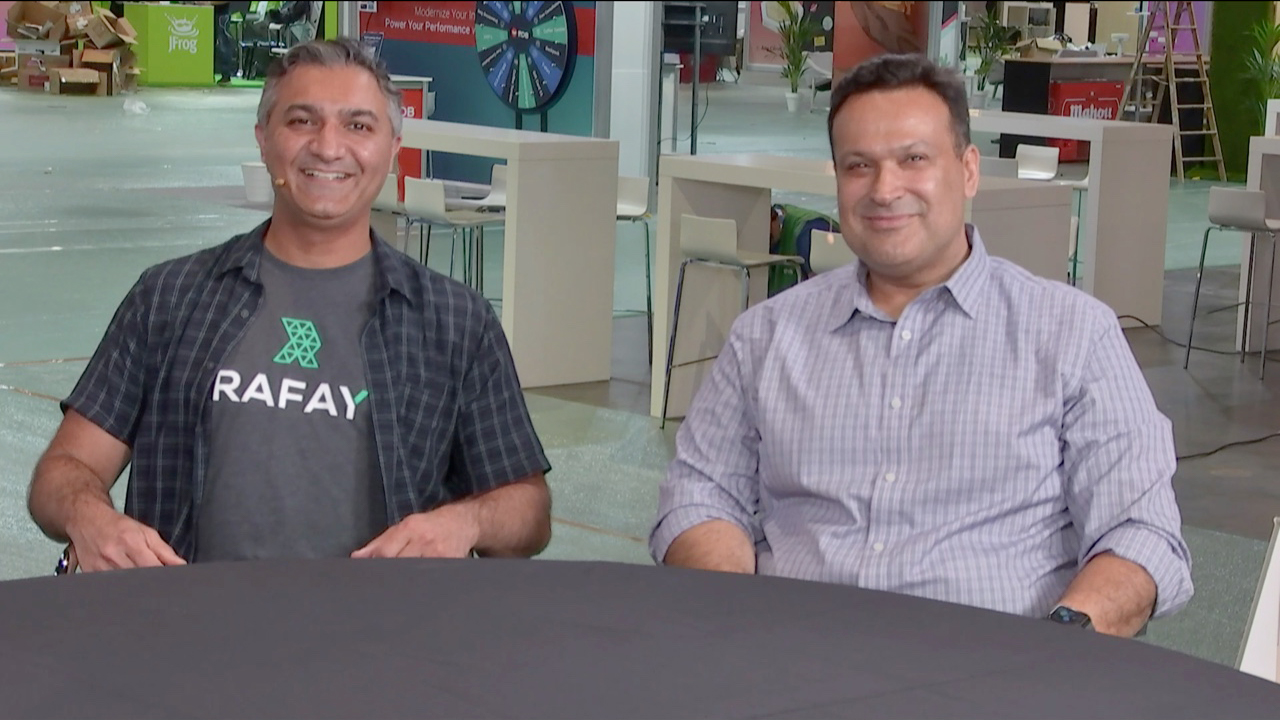 CLOUD
CLOUD
 CLOUD
CLOUD
 CLOUD
CLOUD
The major cloud providers offer managed container solutions to run and scale Kubernetes on-premises or in the cloud. Yet there are signs that the Kubernetes market has opened a new opportunity for companies seeking to provide essential operational support for what remains a complicated technology.
One such firm is Rafay Systems Inc., a five-year-old startup that has built its business around solving core issues related to automation, security, visibility and governance for Kubernetes.
“I see a bifurcation happening in the Kubernetes space,” said Haseeb Budhani (pictured, left), co-founder and chief executive officer of Rafay. “Amazon has EKS, Azure has AKS, and they are actually really good. But there is an operational layer that is needed. My perspective is that 50,000 enterprises are adopting Kubernetes over the next five to 10 years, and they are all going through the same exact journey, they are all going to end up potentially making the same mistake, which is they are going to assume that Kubernetes is easy.”
Budhani spoke with theCUBE industry analysts Keith Townsend and Paul Gillin at KubeCon + CloudNativeCon Europe, during an exclusive broadcast on theCUBE, SiliconANGLE Media’s livestreaming studio. He was joined by Adnan Khan (pictured, right), enterprise architect at MoneyGram International, and they discussed how Rafay’s solution supports the developer community and the industry’s need for a centralized Kubernetes operational management platform. (* Disclosure below.)
MoneyGram is an Amazon Web Services Inc. customer, and it uses EKS to manage the Kubernetes control plane and create clusters. Rafay offered an opportunity for the online money transfer services company to not only solve operational management challenges with Kubernetes, but to support the company’s developers as well.
“What about all of the other things like centralized dashboard, what about the need to provision Kubernetes clusters on multicloud?” Khan asked. “Operations was one aspect to it, and the other part was application development. Developers can go in and monitor the status of their workloads, they don’t have to figure out how to configure all of these tools locally just to get them to work.”
Rafay’s management solution follows a pattern seen in other sectors of the tech industry. As virtual machines grew in popularity, VMware Inc. launched vCenter as a centralized platform for controlling vSphere environments. Budhani believes that Rafay is serving a similar need.
“My view is that this market needs a vCenter, but for Kubernetes,” Budhani said. “This is the right time to have a product like this in the market, because so many enterprises are thinking of modernization.”
Here’s the complete video interview, part of SiliconANGLE’s and theCUBE’s coverage of the KubeCon + CloudNativeCon Europe event:
(* Disclosure: TheCUBE is a paid media partner for the KubeCon + CloudNativeCon Europe event. Neither Rafay Systems Inc., the sponsor of this segment, nor other sponsors have editorial control over content on theCUBE or SiliconANGLE.)
Support our mission to keep content open and free by engaging with theCUBE community. Join theCUBE’s Alumni Trust Network, where technology leaders connect, share intelligence and create opportunities.
Founded by tech visionaries John Furrier and Dave Vellante, SiliconANGLE Media has built a dynamic ecosystem of industry-leading digital media brands that reach 15+ million elite tech professionals. Our new proprietary theCUBE AI Video Cloud is breaking ground in audience interaction, leveraging theCUBEai.com neural network to help technology companies make data-driven decisions and stay at the forefront of industry conversations.